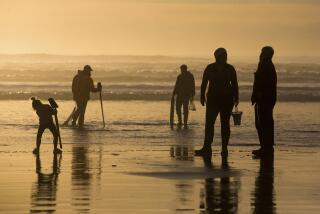Power returns to battered Northwest
- Share via
SEATTLE — As utility crews worked to restore power to 1 million customers across the wind-wracked Pacific Northwest, hospitals here said Saturday that they had treated about 80 victims of poisoning by carbon monoxide -- from gas grills, propane heaters, generators and charcoal briquettes brought indoors for heat and light.
No one was known to have died from the poisoning as of Saturday night, but health officials put out an alert for residents to avoid the potentially lethal practice, which had also led to at least four house fires overnight as temperatures dipped into the 20s and 30s.
“If you are seeking warmth until your power is restored, please seek out safe options, such as shelters or the kindness of friends and family,” said Dorothy Teeter, interim director and health officer for Public Health Seattle & King County. “Carbon monoxide poisoning can kill you, and these cases we’ve seen show how serious the risk is.”
Victims ranged in age from 1 to 72.
Carbon monoxide is an odorless byproduct generated when fuel is burned, and without proper ventilation it can quickly become deadly. It initially causes headaches and nausea.
The record-breaking windstorms -- up to nearly 70 mph in Seattle and 95 mph along the Pacific Coast -- roared into the region Thursday night and early Friday, toppling trees and transmission towers and knocking out power to 1.5 million customers across Washington and in western Oregon and northern Idaho.
By Saturday evening, power had been restored to about 1 million homes and businesses, and officials said that most remaining customers should have it by sometime today.
However, they said, some outlying areas with heavy tree damage and downed lines might not get power for days.
Temperatures were expected to moderate into the 40s by today, and skies were mostly clear without strong wind, said Johnny Burg, a National Weather Service meteorologist in Seattle.
“So it’s relatively calm, and the good news is we don’t see another big storm coming in anytime soon. But it’s still quite chilly,” Burg said. “And that’s a problem for those without power.”
In a south Seattle apartment building, at least three Somali immigrant families sought to stave off the cold by burning coals on a hibachi.
After a 5-year-old boy started throwing up and family members complained of severe headaches, other residents realized they could have carbon monoxide poisoning. They were taken to Harborview Medical Center.
“They didn’t know they could get so sick,” said Hodan Kariye, a friend of one of the families. “They were just trying to keep their kids warm.”
Firefighters in the suburb of Kent also found at least 33 people from four families suffering from carbon monoxide poisoning Friday night, and they also were taken to Harborview for oxygen treatment, Kent Fire Department Capt. Kyle Ohashi said.
At least six people across the region have died in storm-related incidents. In Washington, two perished in traffic accidents involving windblown trees, one drowned after getting trapped in her flooded basement, and a fourth was killed in his sleep by a tree that fell on his home.
In Seaside, on the Oregon coast, an elderly couple died in a fire caused by candles they were using for light.
On Oregon’s Mt. Hood, a break in the weather allowed search-and-rescue teams to get close to the 11,239-foot summit in their search for three hikers missing for the last week. Despite those efforts and several helicopter overflights, no trace of the three men was found.
And though prospects appeared grim, search officials noted that lost hikers in previous incidents on the mountain had been able to hold out for a week or longer by burrowing into snow caves.
Hood River County Sheriff Joe Wampler said searchers had found no evidence of any gear left by the three men, which could be a positive sign, especially if they had their “bivvy sack” sleeping bags with them.
Meanwhile, on the coast, Coast Guard helicopter crews were looking for three men believed to have been aboard a 45-foot catamaran that washed up empty Friday in Lincoln City, Ore., about 70 miles southwest of Portland.
The twin-hulled craft had sailed from South Africa to San Francisco, and the men headed out from there Dec. 8, passing through the Golden Gate on their way to deliver the catamaran to its owner in Seattle.
Inside the wreck, Coast Guard searchers found a logbook with a final entry of 3 a.m. Monday, at about 10 miles off the coast and roughly 160 miles south of where the craft washed up.
That was just about the time a series of storms was moving in from the west, said Petty Officer Shawn Eggert, a Coast Guard spokesman in Seattle.
“There’s no question,” Eggert said, “those would have been some very rough waters.”
sam.howe.verhovek @latimes.com
More to Read
Sign up for Essential California
The most important California stories and recommendations in your inbox every morning.
You may occasionally receive promotional content from the Los Angeles Times.










